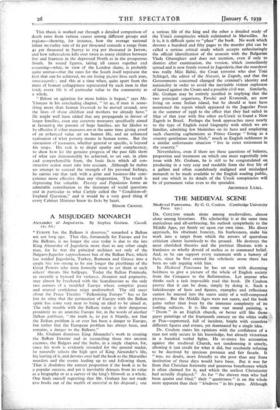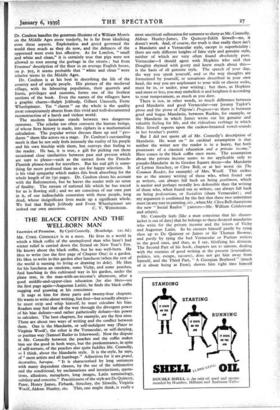THE MEDIEVAL SCENE
DR. COULTON stands alone among medievalists, almost alone among historians. His scholarship is at the same time meticulous and all-embracing, his outlook sympathetic to the Middle Ages, yet firmly set upon our own time. His direct approach, his obstinate honesty, his fearlessness, make his work into a target from which the arrows of querulous criticism clatter harmlessly to the ground. He destroys the most cherished theories and the prettiest illusions with a frankness so wholly devoid of malice as to command belief. And, as he can support every statement with a battery of facts, since he first entered the scholastic arena there has been no safe arguing with him.
In Medieval Panorama he has set out with disarming boldness to give a picture of the whole of English society from the Conquest to the Reformation. Let anyone who thinks such a task impossible read this book. Dr Coulton proves that it can be done, simply by doing it. Such a kaleidoscope of facts and figures, examples and reflections cannot be massed into the suave unity of a well-composed picture. But the Middle Ages were not suave, and the book gains rather than loses by the immense complexity of its jostling subjects. It is. like some vast mural painting, 'a " Doom " in an English church, or better still like those --, gayer paintings of the fourteenth century on the white walls 41 at Pisa—segmented, full of incident, bright with countless different figures and events, yet dominated by a single idea.
Dr. Coulton states his opinions with the confidence of a man not only secure in his knowledge, but already victorious in a hundred verbal fights. He re-states his accusation against the medieval Church, not condemning it utterly, allowing it just credit for what it did, but resolutely refusing to be deceived by specious pretence and fair facade. It " was, no doubt, more friendly to the poor than any State institution of those 'days would have been. But it was far from that Christian fraternity and generous beneficence which is often claimed for it, and which the earliest Christianity had actually displayed." As for " the shaven men who had been quaint and kind," their " quaintness "' is on the whole more apparent than their " kindness " in his pages. Although Dr. Coulton handles the generous illusions of a William Morris on the Middle Ages more tenderly, he is far from idealising even these aspects. Exploitation and greed governed the world then much as they do now, and the defences of the oppressed were even less effective. As for London, " small and white and clean," it is certainly true that pigs were not allowed to root among the garbage in the streets ; but from Erasmus' description of the floor in an average English house, on p. 305, it seems probable that " white and clean " were relative terms in the Middle Ages.
Dr. Coulton is at his best in describing the life of the country and of simple people. His picture of the medieval village, with its labouring population, their quarrels and feasts, privileges and customs, forms one of the liveliest sections of the book. Even the names of the villagers have a graphic charm—Ralph Jolibody, Gilbert Uncouth, Evote Wheelspinner. Yet " charm " on the whole is the quality most conspicuously absent from this vivid and well-documented reconstruction of a harsh and violent world.
The modern historian stands between two dangerous extremes. The scholar too often converts the human beings, of whose lives history is made, into ciphers in a mathematical calculation. The popular writer dresses them up and " pro- duces " them like actors on a stage. Dr. Coniton's outstanding merit is that he not only feels intensely the reality of his people and his own kinship with them, but conveys that feeling to the reader. He has, it is true, a gift for picking out those occasional close similarities between past and present which are sure to please—such as the extract from the French- Flemish phrase-book for travellers. But his real gift is some- thing far more profound than an eye for happy selection. It is his vital sympathy which makes this book absorbing for the whole length of its 73o pages. Dr. Coulton closes his account with the Reformation, but he leaves the reader with no sense of finality The stream of national life which he has traced for us is flowing still ; and we are conscious of our own part in it, of our indissoluble connexion with those people, long dead, whose insignificant lives made up a significant whole. We feel that Ralph jolibody and Evote Whcelspinner are











































 Previous page
Previous page